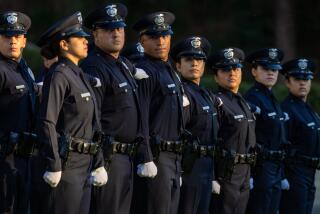Following the beat in a Cairo neighborhood
- Share via
CAIRO — Faces peek out through the wire mesh in the green trucks that rumble through the morning. They are not prisoners, but they seem so. A back door opens and they drop out one by one in their black uniforms, scuffed shoes and clumsily tilted berets.
Their rifles clatter, they are on the beat. They yawn and stretch and meander through the neighborhood, a trickling dark sea beneath the jacaranda and magnolia. They watch the Western girls, unveiled and unattainable, scurry to schools and cafes past bicycle delivery boys and men calling for “junk, junk” outside embassies and the homes of the rich.
They are young, these policemen, carrying bread and beans in plastic bags, taking positions on corners, along train tracks, in front of the villas of diplomats; they wait for trouble or lunch. No one here seems particularly worried, not even after the recent bombing in the Cairo bazaar that killed a French schoolgirl or the stabbing of an American teacher a few days later.
This is Maadi, a southern neighborhood just off the Nile, a place of draped vines and shaggy willows where gardeners hustle hoses across narrow streets and black-and-white taxis troll for fares, rattling and held together by spare parts and ingenuity, their drivers sometimes pulling into the shade to slumber. There are no meters, the taxi man sets a price, the passenger counters, heads shake, an agreement is reached.
Walkie-talkies squawk like birds. There are the police you see -- the young men in their uniforms and smiles -- and those you aren’t supposed to notice, the undercover guys with bumps beneath their jackets, who whisper into car windows and call aside laborers in tunics. It seems conspiratorial, a sprawling secret conversation at the edge of the lives of expats, who appear oblivious, zipping around in SUVs, playing baseball and backgammon, hurrying off to swimming classes and yoga meditation.
The eyes watch. Sometimes the eyes sleep; snoozing policemen in the 2 p.m. heat. Egypt is a police state. It runs on bribes, informers and the hauling away of suspicious men. It knows terrorism and has spawned its share of Islamic radicals: Ayman Zawahiri, a surgeon turned Al Qaeda lieutenant whose screeds are posted on the Internet, grew up in Maadi in a family of scholars and doctors.
The blast in the bazaar turned the mood a bit edgier, and suddenly roadblocks appeared where they hadn’t been and streets that had been dark at night were brightly lighted. A poor country struggling through the global financial crisis and relying on foreign workers and tourists can’t afford explosions and staccato images of bloodshed on the evening news.
Maadi stayed calm, perhaps with an underlying buzz of anxiety, but nothing to change routines, except the intemperate winter weather, which turned from cold to dust storms to sun. An ancient rhythm. The policemen roamed. They checked their bullets. They filled out time charts, thumbed the Koran; the lower ranks fetched more beans and bread, joking with the drivers who waited for women carrying bags of fish and meat and packages of cookies that each cost more than what a policeman earns in two days.
The mosques filled and emptied. The sun made ghost shadows of laundry against the buildings. The maids went home; the nannies were dispatched. The school day was done.
Teenage girls with Western money walked past a policeman with a worn Kalashnikov and loose buttons dangling from his uniform. He was not much older than they were. They see each other every day, but know nothing of each other. They share only a space. He protects them until the green truck arrives and fresh policemen drop to the pavement as he climbs aboard and the back door closes for the long ride home, over the bridge and far away from the jacaranda and magnolia.
--
More to Read
Sign up for Essential California
The most important California stories and recommendations in your inbox every morning.
You may occasionally receive promotional content from the Los Angeles Times.













